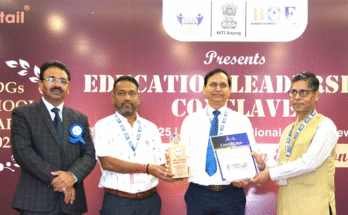JNS: Discussions on ethical concerns and algorithmic prejudice in the machine learning process kick off the 5th IEEE International Conference on Recent Advances in Information Technology (RAIT-2023) at IIT (ISM) Dhanbad.
Professor Anupam Basu of IIT Kharagpur, who was in IIT (ISM) Dhanbad today raised the ethical issues and the issues of algorithmic bias that often go unnoticed in the present machine learning systems. He was speaking as chief guest during the inaugural day of the 5th IEEE International Conference on “Recent Advances in Information Technology (RAIT–2023)” at IIT(ISM), Dhanbad.
The conference being held in Golden Jubilee Lecture is being organized by the Department of Computer Science & Engineering of Indian Institute of Technology (Indian School of Mines), from 3 to 5 March.
Professor Basu’s lecture was aimed at making scientists, engineers and people, in general, aware of the possible ethical consequences of indiscriminate use of AI while it was not meant to undermine its power and beneficial aspects of Artificial Intelligence.
He also stressed upon the overall mental development of the students during his thought-provoking speech and emphasized on the skills that the students and researchers of Computer Science and Information Technology should develop and the direction they should follow in the future.
“The inaugural function was presided over by Professor Rajiv Sekhar, Director IIT (ISM). Altogether 37 papers were received, and after critical review from International and National reviewers, 17 have been accepted for presentation during four technical sessions,” said Professor Sachin Tripathi, the general chair for the conference.
“Besides the inaugural session and the keynote addresses, the first day witnessed two invited talks from the industry and one technical session,” further said, Professoressor Anshuman Bhattacharya who is the programme chair.
In the first talk, Dr Snehasis Banerjee, TCS Innovation Lab, spoke about several embodied AI tasks backed by results, demos and insights on goal-oriented navigation, scene re-arrangement, human-robot interaction, social navigation, etc. As a bonus, some other relevant research projects going on in the industry will be touched upon.
Dr Ankur Bal presented the second talk on digitally assisted analog circuits can exploit digital circuits’ flexibility, high density and low energy per computation to enable a new generation of designs based on minimal-precision, low-complexity analog building blocks.
The talks followed the first technical session, where four research papers were presented on the theme of Artificial Intelligence and Machine Learning.




